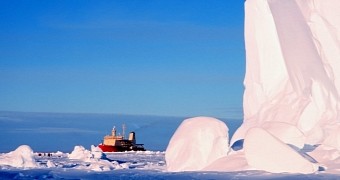A recent investigation found that the Larsen-B Ice Shelf in Antarctica collapsed back in 2002 not because its bottom had been damaged by warm waters, but due to an increase in local air temperatures.
This investigation was carried out by an international team of researchers, and its findings are detailed in a paper in the journal Science. Its outcome just goes to show that global warming and climate change are reshaping the world as we know it.
How warm weather affects glaciers
As detailed in the journal Science, there are some who claim that Antarctica's Larsen-B Ice Shelf threw a fit and collapsed over a decade ago after being eaten at from below by warm waters in the region. However, there is no evidence to support this theory.
On the contrary, an analysis of sea floor samples collected from the area where this ice shelf fell revealed that, structurally-wise, Larsen-B's bottom was in perfectly good shape at the time of the collapse. Hence, it's warm weather that must have been the culprit.
More precisely, it is believed that, the higher air temperatures in the region accommodating for this ice shelf got, the more pools of water formed on top of the massive block of ice. In time, these pools cause the ice beneath to experience further melting.
Eventually, the water resting on top of the ice shelf managed to work its way through the block of ice's body. While traversing Larsen-B's core, this water ate away at its core, thus creating dozens of crevices, which made the block of ice seriously unstable.
Writing in the journal Science, the specialists behind this research project argue that, at one point, the Larsen-B Ice Shelf found itself sporting so many crevices on the inside that it simply fell apart. In a nutshell, it broke down and collapsed into the surrounding water, Phys Org explains.
The importance of this study
As mentioned, this investigation is bound to help scientists reach a better understanding of how ongoing climate change and global warming are changing our planet. Specifically, the study should lead to better predictions concerning future sea level rise.
Interestingly enough, collapsing ice shelves do not in themselves promote sea level rise. This is because these blocks of ice are already floating on water. However, having an ice shelf collapse means that the glacier that birthed it and kept it alive will much faster flow towards the sea. It is this phenomenon that causes an increase in local sea level by dumping more ice into the water.

 14 DAY TRIAL //
14 DAY TRIAL //